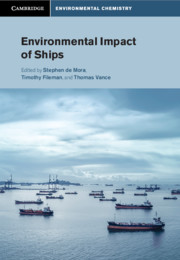Book contents
- Environmental Impact of Ships
- Cambridge Environmental Chemistry Series
- Environmental Impact of Ships
- Copyright page
- Contents
- Contributors
- Preface
- 1 Shipping, Ships and the Environment
- 2 Atmospheric Emissions from Ships
- 3 Oil Pollution from Operations and Shipwrecks
- 4 Waste and Sewage
- 5 Ballast Water
- 6 Biocides from Marine Coatings
- 7 Invasive Species
- 8 Physical Effects of Ships on the Environment
- 9 Ship Noise
- 10 Vessel Strikes and North Atlantic Right Whales
- 11 Nuclear-Powered Vessels
- 12 Environmental Impacts of Shipbreaking
- 13 International Legislative Framework
- 14 Shipping Industry’s Perspective
- 15 Environmental Impacts of Shipping
- Index
13 - International Legislative Framework
Published online by Cambridge University Press: 22 January 2021
- Environmental Impact of Ships
- Cambridge Environmental Chemistry Series
- Environmental Impact of Ships
- Copyright page
- Contents
- Contributors
- Preface
- 1 Shipping, Ships and the Environment
- 2 Atmospheric Emissions from Ships
- 3 Oil Pollution from Operations and Shipwrecks
- 4 Waste and Sewage
- 5 Ballast Water
- 6 Biocides from Marine Coatings
- 7 Invasive Species
- 8 Physical Effects of Ships on the Environment
- 9 Ship Noise
- 10 Vessel Strikes and North Atlantic Right Whales
- 11 Nuclear-Powered Vessels
- 12 Environmental Impacts of Shipbreaking
- 13 International Legislative Framework
- 14 Shipping Industry’s Perspective
- 15 Environmental Impacts of Shipping
- Index
Summary
International environmental law is one of the most rapidly evolving branches of international law. It encompasses intergovernmental organizations, non-governmental organizations, international financial organizations, associations of private-sector corporations and trade groups. There are several sources of international law: bilateral and multilateral treaties (conventional law), practice of legal customs (customary law), general principles of law adopted in national laws and judical decisions and experts writings. The new source of law comes from intergovernmental organizations and other entities that produce resolutions, declarations, guidelines, etc., that have recommendatory power. It is called soft law because it is non-binding, but it can become binding over time. Corporate social responsibility (CRS) is a concept that signifies the integration of environmental, social and human rights awareness into the corporate business model. Today, corporations voluntarily adopt CRS policy because it brings competitive advantage. In spite of the fact that critics see it as a greenwashing instrument, corporations can promote environmental responsibility more efficiently than governments because they have financial and human resources at their disposal.
- Type
- Chapter
- Information
- Environmental Impact of Ships , pp. 329 - 351Publisher: Cambridge University PressPrint publication year: 2020
- 1
- Cited by



